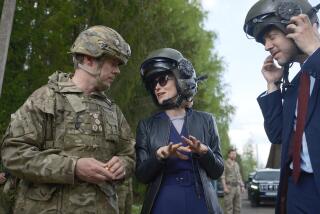New Soviet Spy Chief Wants No Cold War : Espionage: Primakov downgrades cloak-and-dagger games. He will submit agency’s work to public scrutiny.
- Share via
MOSCOW — The Kremlin’s new spymaster, already at work on creating a better image for Soviet intelligence, pledged Wednesday to prevent a return to the Cold War, to submit much of his agency’s work to public scrutiny and to focus on analysis rather than cloak-and-dagger games.
“If you think intelligence is men in gray raincoats standing behind buildings eavesdropping on conversations and occasionally using clubs to ‘take people out,’ then my appointment would seem very out of place,” Yevgeny M. Primakov, formerly a presidential adviser on foreign affairs, told a press conference two days after taking office as the new head of intelligence.
“But intelligence is an enormous organism that has to apply analytical methods more and more,” said Primakov, once a journalist and academic. “It should synthesize information, analyze it and make forecasts--and in this respect, intelligence is scientific.”
Primakov’s appointment Monday heralded further shake-ups in the KGB, the intelligence and security agency once seen as nearly all-powerful but now undergoing purges and reorganization after its involvement in August’s coup attempt.
His foreign intelligence section, formerly the agency’s First Main Directorate and not yet renamed, is in the process of being removed from the KGB, Primakov said, although the exact division of functions is not decided yet. Meantime, he is technically a deputy to the liberal new KGB chief, Vadim V. Bakatin.
Asked if Soviet intelligence would now be divided into something like the U.S. system, with a counterpart to the CIA working abroad and the equivalent of the FBI domestically, Primakov said noncommittally, “Thank you for the idea you’ve given me.”
Although Primakov took questions jovially, the KGB’s radical reform has already begun to draw serious criticism from its victims.
Leonid Shebarshin, the man Primakov replaced as head of intelligence, said in an interview published Wednesday in the daily Komsomolskaya Pravda that political appointments to key posts are already hurting the KGB’s professional level and that hasty, ill-considered decisions are being made.
“Temporary people are trying to decide the methods of the reorganization of intelligence and its personnel policy,” he said. “I’ve always believed that intelligence is a live, fragile and very delicate organism that doesn’t tolerate harsh breaks.”
Primakov, too, said that he opposes purges and sharp changes, but much of what he said pointed up the sharp contrast between his approach and the former conservative head of the KGB, Vladimir A. Kryuchkov, who is now charged with treason.
Primakov said he does not believe that Western intelligence services are seeking the collapse of the Soviet Union, as Kryuchkov often asserted, arguing instead that “they want to see a unified, democratic state.”
He came out strongly against spies posing as journalists abroad, said he hoped to imitate the CIA custom of cooperating with scholars and businessmen and said that his agents have better things to do than to spy on Soviet citizens abroad.
He also promised to keep as much of his agency’s work public as possible.
In other KGB reforms under way, the Tass news agency reported Wednesday, the KGB section responsible for listening to bugged phone lines is about to be cut back by one-third. In the future, phone conversations will be bugged only with the prosecutor’s permission, Tass reported, citing a “reliable source” in the KGB.
The clandestine service has made a practice of placing microphones along walls on the street, monitoring phones so calls are cut off if certain phrases are used and sending in super-quick teams to bug apartments when the occupants are out, the weekly newspaper Argumenty i Fakty disclosed.
Primakov laid little emphasis on the classical spy trade and said he sees his intelligence service’s objectives as global--to prevent the return of the Cold War, to stop the proliferation of nuclear weapons and to fight international terrorism, narcotics trade and economic manipulation that could hurt Soviet finances.
Primakov, 61, would appear to be little equipped for his new post, having spent most of his career as a journalist for the Communist Party newspaper, Pravda, as a specialist in Arab affairs and most recently as an adviser to Soviet President Mikhail S. Gorbachev, undertaking some of his most delicate diplomatic missions.
But he said that although he had never worked for Soviet intelligence, “I am coming there not exactly as a novice. Why? Because in the course of my work, I came across many agents and communicated with them. Judging by what I saw and heard, I knew what was happening and how things were being done.”
More to Read
Sign up for Essential California
The most important California stories and recommendations in your inbox every morning.
You may occasionally receive promotional content from the Los Angeles Times.












